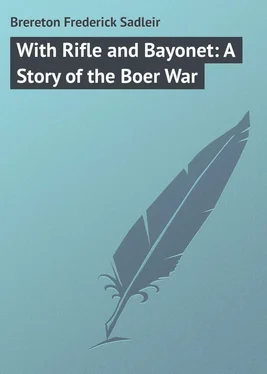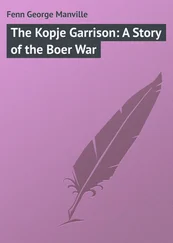Frederick Brereton - With Rifle and Bayonet - A Story of the Boer War
Здесь есть возможность читать онлайн «Frederick Brereton - With Rifle and Bayonet - A Story of the Boer War» — ознакомительный отрывок электронной книги совершенно бесплатно, а после прочтения отрывка купить полную версию. В некоторых случаях можно слушать аудио, скачать через торрент в формате fb2 и присутствует краткое содержание. Жанр: foreign_prose, foreign_children, на английском языке. Описание произведения, (предисловие) а так же отзывы посетителей доступны на портале библиотеки ЛибКат.
- Название:With Rifle and Bayonet: A Story of the Boer War
- Автор:
- Жанр:
- Год:неизвестен
- ISBN:нет данных
- Рейтинг книги:5 / 5. Голосов: 1
-
Избранное:Добавить в избранное
- Отзывы:
-
Ваша оценка:
- 100
- 1
- 2
- 3
- 4
- 5
With Rifle and Bayonet: A Story of the Boer War: краткое содержание, описание и аннотация
Предлагаем к чтению аннотацию, описание, краткое содержание или предисловие (зависит от того, что написал сам автор книги «With Rifle and Bayonet: A Story of the Boer War»). Если вы не нашли необходимую информацию о книге — напишите в комментариях, мы постараемся отыскать её.
With Rifle and Bayonet: A Story of the Boer War — читать онлайн ознакомительный отрывок
Ниже представлен текст книги, разбитый по страницам. Система сохранения места последней прочитанной страницы, позволяет с удобством читать онлайн бесплатно книгу «With Rifle and Bayonet: A Story of the Boer War», без необходимости каждый раз заново искать на чём Вы остановились. Поставьте закладку, и сможете в любой момент перейти на страницу, на которой закончили чтение.
Интервал:
Закладка:
But there was really no need for the cutting down of prices. A store in such a populous town was a valuable property, and Mr Hunter’s had a reputation which ensured the various departments brisk business all day long. All who patronised it seemed to be in a prosperous way, and indeed only grumbled that all their energies and business prospects were smothered by the continual opposition and stupid action of President Kruger and the Boers.
To say that Jack enjoyed the life he was now leading was to describe his feelings rightly. He took the deepest interest in his work, and after his hours in the shop were done, generally went for a gallop with one or more of the many young fellows he knew. Christmas came and went, and by the early months of the New-Year, the eventful and never-to-be-forgotten year of 1899, he was quite himself again, a rosy-cheeked and manly-looking young fellow whom everyone but Piet Maartens and his Boer sympathisers liked.
So well did Jack’s life agree with him that he was within an ace of deciding to forego his commission in the army and remain for good in Africa. But Mr Hunter dissuaded him.
“You are too young to settle down as yet,” he said. “And besides, it was your father’s wish that you should follow his footsteps and enter the army. Of course we should prefer you to stay, but under the circumstances I hope you will return and go up for that examination. Later on, perhaps, when you have knocked about the world a little more, you may wish to resign your commission, and then if you join us here all the better! You will be older and more ready to settle down, and your family ties in England are not likely to prevent your emigrating if you wish to do so.”
Jack recognised the wisdom of doing as Mr Hunter suggested, and accordingly made all preparations to leave Africa in the following August.
But the old proverb that “Man proposes and God disposes” was exemplified in his case. Events proved too strong for him, and he remained in the country, shoulder to shoulder with his English friends, to face the storm of passion which was soon to burst over their heads, and to take his part in the bitter struggle which was to be fought out between the Boers and their allies, and the sons of our mighty empire.
Chapter Four.
A Startling Adventure
“Jack, how would you like to carry out a little piece of business for me?” asked Mr Hunter one morning, extracting a letter from a big bundle which he held in his hand.
“I have just had this offer of leather goods from the agents in Durban, with whom I am in the habit of dealing. In spite of war scares, and the fear that we should have to leave the country suddenly, shoals of new-comers constantly reach us, and such articles as bags and trunks are always in demand by those who are forced to travel from town to town. Saddlery, bits, and reins are also easily disposed of. This would be a good opportunity for you to make a run down to Durban. You have never been there, and you could inspect these goods between the hours when you will be looking round the town.
“There is a list of the articles that have just been shipped over from England, and you will notice that against the prices quoted I have ticked down the amount usually asked for here. If the goods are of first-rate quality, you may close with the agents at once.”
“Thanks! It’s very good of you, and I’d like to go immensely, Mr Hunter,” Jack answered. “How many of each of these items am I to buy? I see you have not stated that.”
“Well, I imagine it is a big consignment, Jack, and I believe by buying now I shall be able to sell all at a large profit, for I think there is likely to be an unprecedented demand very shortly. So I shall leave it to your discretion to buy as many as you think reasonable. Here is a signed cheque. Of course you will get something taken off for a large order, and the terms I shall also leave to you. You have already shown you possess a business head, and I can therefore rely upon your carrying the arrangements out satisfactorily. Fill in the cheque and hand it over when you have settled the matter. To-day is Saturday. You had better start on Monday morning, and I shall expect you back on the Thursday or Friday following.”
Jack was delighted at the confidence placed in him, and set off on the Monday morning in the highest spirits. He purchased a return ticket, shook hands with Wilfred – who would have liked to accompany him, but had to remain behind, as his father was going to Kimberley for a few days, – and jumped into a luxuriously-furnished carriage.
It was a long and monotonous journey to Durban. Many of the towns they passed through, however, bore names which only a few months later were to be in the mouths of all Englishmen, in fact of the whole of the civilised world.
Running south towards the Orange Free State border, the railway curved towards the south-east, passing in succession Heidelberg, Standerton, and Volksrust. Then, with a loud and piercing shriek from the engine whistle, the train dived into a long, dark tunnel in the Drakenberg range of mountains, and emerged into Natal, one of England’s most loyal colonies. Sweeping past Laing’s Nek and Majuba Hill, names which will ever cause our countrymen to grit their teeth with vexation and regret, the train passed through a mountainous and extremely rugged country, and finally pulled up at Newcastle, one of the towns where the opening scenes of the second Boer war were to be laid. Then, after a ten-minute wait, the guard’s whistle sounded, and they steamed on past Glencoe and Dundee, and, swerving to the right away from the neighbourhood of Rorke’s Drift (that little mission station on the banks of the deep, swift-flowing Buffalo River, where a mere handful of English soldiers kept at bay the flower of Cetewayo’s army of fierce Zulus), they ran through Elands Laagte and Reitfontein, and drew up once more, at Ladysmith. On proceeding, the train ran down to the river Tugela, skirted its western bank, and thundered across the bridge, and on past Chieveley and Frere to Estcourt, stopping only when it had run into the station at Pietermaritzburg. From there to Durban was only a short spin, and very soon Jack had arrived, and had been whirled to his hotel on a “rickshaw” drawn by a strapping Kafir.
On the following day he called on the agents, and inspected the leather goods he had been commissioned to buy; and having decided how many to take, and offered a certain sum down for the articles he required, he left the warehouses, promising to call at the same hour next day and hear whether they would accept it or not.
Then he took a “rickshaw” a little way out of the town, and called upon a young fellow who had sailed out from England with him.
“What! Somerton! The fellow with a groggy leg whom the ladies on board took so much care of!” the latter exclaimed, shaking Jack cordially by the hand, and forcing him into a chair on the shady verandah on which the two lads had met.
“Boy! Joko! Do you hear?” he shouted. “Look lively! I’m on the verandah.”
“Coming, Baas! coming!” sounded away from the opposite side of the house, from which a Kafir appeared a moment later, in a desperate hurry to obey his master.
“Now, Somerton,” said Jack’s jovial friend, whose name was Turner, “join me in a lemon-squash and a cigarette. It’s a funny combination, but I find it agrees with me, and I’m sure it’s far better for one than drinking spirits as many fellows do.”
Jack gladly agreed to do so, and soon they were lolling back out of the heat of the sun, puffing their cigarettes, for that was a habit which Jack had already learnt to appreciate, and chatting about their respective doings for the past few months.
“So you’re up in the Transvaal with Mr Hunter, and under the eyes of the Boers, are you?” said Turner, when he had heard how Jack had been employing his time. “Well, I dare say you fellows up there know more about affairs than we do here; but there are going to be ructions, awful ructions, I feel sure, and if I were you I should get ready to leave at a moment’s notice.”
Читать дальшеИнтервал:
Закладка:
Похожие книги на «With Rifle and Bayonet: A Story of the Boer War»
Представляем Вашему вниманию похожие книги на «With Rifle and Bayonet: A Story of the Boer War» списком для выбора. Мы отобрали схожую по названию и смыслу литературу в надежде предоставить читателям больше вариантов отыскать новые, интересные, ещё непрочитанные произведения.
Обсуждение, отзывы о книге «With Rifle and Bayonet: A Story of the Boer War» и просто собственные мнения читателей. Оставьте ваши комментарии, напишите, что Вы думаете о произведении, его смысле или главных героях. Укажите что конкретно понравилось, а что нет, и почему Вы так считаете.












